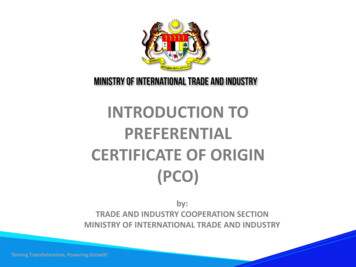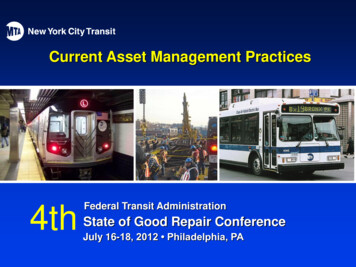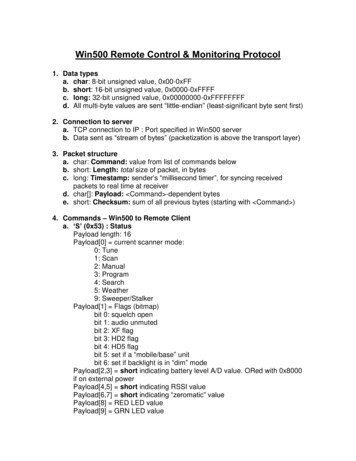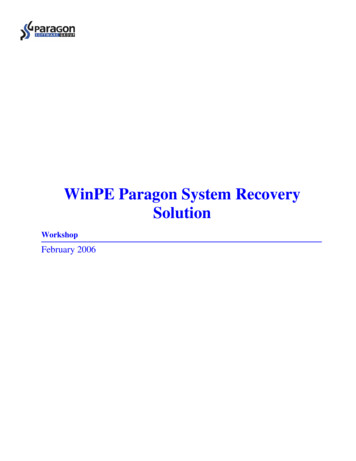
Transcription
The PSRStrategySummary versionJanuary 2022psr.org.uk
The PSR StrategyOur strategyat a glancePayments are an essential part of life forall of us. The PSR is here to make sure thatpayment systems – and the markets theysupport – work well for all the people andbusinesses that rely on them.We’ve designed our strategy to guideour activity over the next five years.We’ve established what we want toachieve, and the priority areas wherewe’ll focus our resources – so that wecan use those resources most effectivelyto achieve the outcomes we want.What we want to seeThe outcomes we’re aiming forPaymentsystems meetpeople’s needsEffectivecompetitionin paymentsWhat we’ll doOur priority action areasAccessand choice2Users areprotectedProtectionSee page 4Efficientpayment systemsSee page 10CompetitionUnlockingaccount-to-accountpayments3
The outcomeswe’re aiming forOur strategy is designed around the outcomeswe want to see in payments. Across all our work,we’ll make sure our decisions help bring aboutthese outcomes. There are four key outcomes,which are all part of making sure people can makeand receive payments in ways that suit their needs.Payment systems meet people’s needsEveryone can make and receive payments in ways that suit them.Users are protectedPeople and businesses are protected when they make payments.Effective competition in paymentsEffective competition in payments leads to better services for everyone.Efficient payment systemsPayment systems are efficient and commercially sustainable.45
The PSR StrategyThe outcomes we’re aiming forThe outcomes we’re aiming forPayment systems meetpeople’s needsUsers are protectedEveryone can make and receive payments in ways that suit them.Payment services should be suitable for the needs of thosewho use them.Every function that people need should be provided by at leastone payment system.People and businesses are protected when they make payments.Everyone who makes payments should be able to do sowith confidence.Payment systems should work to prevent harm (such as fraud).The payments industry should provide effective and appropriateredress when harm does occur.Everyone should be able to make an informed choice aboutwhich payment type to use.Payments are somethingthat many of us take for grantedwhen we buy goods andservices online, or receive ourwages or a pension. But they’reessential for our society andeconomy to function effectively.In the UK currently, differenttypes of payment are designedto meet a variety of needs.We think the payments industryshould provide for the needsof everyone who makes andreceives payments.Right now, we believe mostpeople have access to paymentmethods that meet their needsmost of the time. But weknow there are some groupswho might be underserved.We understand that changesin technology and the paymentslandscape might lead to somepeople and businesses havingfewer options.Case study6Case studyA flexible worker who needsflexible paymentsRob works as a taxi driver. It gives him the flexibility heneeds to manage his family commitments and work longerhours when it suits him. His bills aren’t so flexible though.He pays his mortgage and his phone and utility bills on thesame day every month.Some months, if he’s worked fewer shifts, Rob has to gointo his overdraft and pay a fee to his bank. New types ofpayment messaging and new payment business modelsare being developed that might giveRob more control over when moneyleaves his account. We’re keento encourage innovationlike this, so that morepeople like Rob havethe flexibility they need.We expect payment systemoperators and payment serviceproviders to consider theircustomers’ interests, and ensurethey’re adequately protectedwhen they use paymentservices. They should also: consider the risks that peopleand businesses face whenusing payment services base their risk assessmentson realistic assumptionsabout consumer behaviour consider how people use thesystem and how that usagechanges over timeWe also want people tounderstand the paymentoptions available to them,and be confident about usingdifferent payment methods.Part of this confidence willcome from people knowing theirpayments are safe and secure,but we also want operators andpayment service providers toprovide clear information abouttheir services so people canmake informed choices.Case studyConfirmation of PayeeSaira is buying a second-hand car from a friend, Julian.Julian sends Saira an email with his sort code andaccount number so that she can make the paymentusing online banking. Saira is nervous when settingup the payment as she can’t afford to lose the money.She’s worried that she might mistype the number,and has also read about fraudsters intercepting emailsand giving fake account details.When she puts Julian’s bank details into her bank’s app,it sends a message to Julian’s bank to check whetherthe name that Saira has given matches the name linkedto the bank details. She sees from the app thatthey do match. Now Saira can go ahead andmake the payment with confidence.7
The PSR StrategyThe outcomes we’re aiming forThe outcomes we’re aiming forEffective competitionin paymentsEfficient payment systemsEffective competition in payments leads to better servicesfor everyone.Competition and innovation support good quality payment servicesat appropriate prices.Competition between different payment systems encourages choice.Payment systems are efficient and commercially sustainable.Payment systems should be efficient and offer value for money.The funding model should be viable over the longer term.Payment system operators should encourage sustainablepayment processes.We’ll consider governance, terms and fees to promote greater competition.Competition in paymentsis essential. It encouragesinnovation and providesconditions that support theprovision of good qualitypayment services atappropriate prices. It shouldalso encourage a greatervariety of services.We’ve previously focusedon promoting competitionbetween providers offeringpayment services throughthe same payment system,particularly Faster Payments.Now we think there areincreasing prospects forcompetition betweenservices using differentsystems, supported bytechnology allowing eachsystem to process a widerrange of payment types.We will consider whether thegovernance structures, termsand fees applied by paymentsystems promote greatercompetition between them.8Case studyTwo businesseswith different needsBeverley runs a small independent coffee shop on herlocal high street. She’s noticed that fewer people now usecash, so she needs to buy services that allow her to acceptcard payments. She’s happy with the convenience of cardpayments, but has noticed that her business accountslooked healthier when most customers paid cash.Next door is BigStore, a national kitchen applianceretailer. Its customers often use credit cards to pay forgoods as they know they’re protected by the legislationand rules relating to the payment method if the purchasegoes wrong. However, Beverley’s customers rarely relyon the protection offered – if they don’t like their coffee,she’ll refund them instantly.Although both businesses rely on the same types ofpayment, using the same set of rules, it’s likely thatBeverley is paying more per pound spent to acceptcard payments. We think it’s important that paymentswork for all types of businesses, as well as for people.It’s important that paymentsystems are run efficiently –they need to represent valuefor money. Payment systemoperators and their technicalservice providers often facehigh costs when establishinga system, but lower operatingcosts. They need to chargeparticipants fees to recover theirinvestment costs, cover theiroperating costs, and supportdevelopment and innovation.A sustainable funding modelfor payment systems isrequired. It’s important for usto understand how costs arepassed through the paymentsystems. Some may be paiddisproportionately by thosewho use them or by certaintypes of participants, or we mayfind that high costs discourageentry by new businesses.As payment system operatorsdevelop services, they shouldhelp their participants maketheir own processing moreefficient. We also expect tosee payment system operatorswork to combat the possiblemisuse of payment systems.PaymentsystemThe costs of buildingand running a paymentsystem include: building andmaintaining thephysical infrastructureand technology designing and rollingout rules and standardsPSPsMerchants(shops)ConsumersParticipants inthe system (paymentservice providers)fund these coststhrough fees.Merchants and businessusers generally pay thecosts of the paymentsystems they use, viatransaction and otherfees to their bank.Although most individualconsumers don’t payto make (or receive) apayment, merchantsgenerally pass on thecosts in the prices oftheir goods/services,and banks generallyrecover the coststhrough chargesfor otherservices.9
PSRStrategy Summary 2021Our priorityaction areasTo achieve the outcomes we want, we’ve set fourstrategic priorities. These are the areas where we considerwe can use our people, powers and other resources tohave the greatest impact on the UK’s payments ecosystem.We’ll remain focused on the outcomes we want to see,and may adapt our priorities if necessary in the face ofnew developments over the next five years.Access and choiceEnsure users can use the payment services they rely on and haveeffective payment options.ProtectionEnsure people and businesses are sufficiently protected when usingthe UK’s payment systems.CompetitionPromote competition between payment systems and inpayment services.Unlocking account-to-account paymentsAct to ensure the interbank systems provide infrastructure,rules and incentives that foster innovation and competition.1011
The PSR StrategyOur priority action areasOur priority action areasAccess and choiceProtectionEnsure users can use the payment services they rely on and haveeffective payment options.Ensure people and businesses are sufficiently protected whenusing the UK’s payment systems.Payment services should be accessible on a fair,open and transparent basis.Protection is essential to encourage confidence in thosewho use payment systems.We’ll continue to protect access to cash.Each payment type may require specific protection.We’ll support development of new payment services.As the market changes, protection needs to adapt to avoid gapsin service and quality.Everyone should have easy access to a paymentmethod that suits them, so a range of paymentoptions is needed to fulfil the different needs ofall the various users. It’s essential that there isan effective choice of payment options for peopleand businesses to use, and we’re particularlykeen to consider the needs of vulnerable groups.Choice tends to allow everyone to have aconvenient way of making or receivingpayments for different types of transactions.But we can’t always choose how we makepayments. Sometimes, for example, shopsand businesses don’t accept the types ofpayment we want to make.Nevertheless, we think it’s important thatalternatives are available if someone can’t usetheir first choice of payment method.We will: Remove barriers to the development ofnew services that meet user needs. Apply appropriate and robust regulation toany newly designated payment systems,taking into account the ‘same risk, sameregulation’ principle. Understand the perspectives of vulnerableconsumer groups towards new ways ofpaying and the choices available to them,and account for them in our decisions. Engage with other financial servicesregulators and government to ensure ourdecisions remain aligned with theirs andthe division of responsibilities is clear. Continue to protect access to cash forthose that rely on it.The UK’s payment systems continue to evolve.With people making more payments online,they face different risks that need differentlevels of protection. This is especially crucial forvulnerable and disadvantaged people whose livescould change if they lost a large sum of money– and who may not be able to choose alternativepayment methods.Different protection is needed for each paymenttype. For example, a range of protections applyto credit and, to a lesser extent, debit cardtransactions. In addition, Faster Payments is nowused for a range of uses for which it was notoriginally designed.We will: Develop governance of the interbank rules,with a view to giving Pay.UK a strongerrole to lead the development of protections(and other conduct rules), coordinating itsparticipants where necessary. Pursue ways to ensure reimbursementfor victims of APP scams who have donenothing wrong.Governance is key to providing the frameworkof rules needed, and we want Pay.UK to takea lead in the way that protection is providedto people and businesses who use paymentsystems. This coordination will be essential tohelp prevent the kind of fraudulent behaviour thatdrives authorised push payment (APP) scams. Remove barriers to effective competition. Continue to promote a range of optionsfor payment service providers to accesspayment systems.1213
The PSR StrategyOur priority action areasOur priority action areasCompetitionUnlocking account-to-accountpaymentsPromote competition between payment systems and in payment services.Competition is essential as it tends to lead to better and moreaffordable services.We’re encouraging competition between payment systems andbetween payment service providers.If competition isn’t sufficient, we may need to regulate to achieve it.We think competition is a priority, and it’snot clear that there is sufficient competitionin retail payment methods to provide goodlong-term outcomes. Payment systems havea number of inherent features that discourageentry – including the costs of building them.So far, we’ve focused on encouraging competitionwithin payment systems between differentpayment service providers. Going forward,we want to focus our resources to promotecompetition between payment systems.We think that will lead to better and moreaffordable services for participants and users.We’ll continue our work to open up access topayment systems – making it easier, quicker andcheaper for new service providers to enter themarket and provide competition and innovationin payment services.At this stage we favour placing the emphasison the role of interbank payments, includingOpen Banking. That appears to have the greatestchance of providing a credible alternative for retaildebit payments. If we don’t see real prospectsfor improvements in competition in the longterm, we don’t rule out the potential need forus to regulate in order to protect consumersand businesses.14We will: Develop the interbank systems to providegreater competition for the provision ofpayment services. Take forward a piece of work to examinethe basis for scheme fees and cross-borderinterchange fees. We’ll consider whethershorter-term measures might be appropriatein the intervening period until we developand implement any longer-term measuresto introduce more competition. Keep under review the need for us toregulate in other areas to protect consumersand businesses.Act to ensure the interbank systems provide infrastructure, rules andincentives that foster innovation and competition.The New Payments Architecture (NPA) should encourage competitionand innovation.This will support choice for those who make payments, and appropriatepayments pricing.Pay.UK should be funded so it can promote good outcomes for everyone.The UK’s interbank systems are going througha considerable set of changes. These systems,which are owned and operated by Pay.UK,support payments between deposit accounts,and are used for paying friends and family,paying bills or receiving salaries. Open BankingPayments now also allow firms to initiatepayments on a consumer’s behalf. We thinkthat there is great potential for the use ofOpen Banking Payments to make paymentseasier and quicker for everyone. At the sametime, Pay.UK are planning for the next generationof infrastructure with the New PaymentsArchitecture programme – the UK paymentsindustry’s proposed new way of organisingthe clearing and settlement of paymentsbetween banks.We want to make sure that interbank paymentswork as well as they can for everyone, now andin the future. To do that, we will need to makesure that financial services firms and Pay.UKcan effectively agree rules and standards fornew functionality. New agreements will needto be able to sustain themselves by making surethat it makes commercial sense for people tojoin and belong to interbank systems. We willsupport Pay.UK’s ambition to upgrade and replaceits technology. If new agreements to supportnew ways of paying are created, we will alsoneed to ensure that they can still be reached byregulation, and we will work with the Treasuryto make sure they are.We will: Ensure funding is adequate to enablePay.UK to fulfil its objectives, and thatfunds are allocated in a way that supportsand promotes innovation and competitionin overlay services. Develop governance of the interbank rules,so operators of interbank systems have theability to enforce compliance with them. Promote and facilitate coordination ofpayment system participants where wethink it is needed and not yet happening. Work with the Treasury to ensure newsystems and arrangements come under ourremit if necessary to achieve good outcomes.15
The Payment Systems Regulator Limited 202212 Endeavour SquareLondon E20 1JNTelephone: 0300 456 3677Website: www.psr.org.ukAll rights reserved
A flexible worker who needs flexible payments. Rob works as a taxi driver. It gives him the flexibility he needs to manage his family commitments and work longer hours when it suits him. His bills aren't so flexible though. He pays his mortgage and his phone and utility bills on the same day every month.










